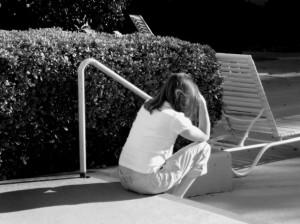I wanted it to be a productive day. I really, badly wanted the day to mean something. I didn’t want it go to waste the way it did.
But what could I do? I was depressed.
It was the spring before my senior year in college, a quiet weekday morning; warm, with soft sunshine pouring in through the blinds and a wafting smell of rose hips from the tea brewing in the kitchen. It was the proper setting to get some work done.
And I certainly planned well for the occasion, writing out a plethora of tasks, things I needed to read and write, jobs to apply to, rooms to clean.
I was 21. I had my own one-bedroom, a loving and supportive girlfriend, a passion for the arts, and a summer devoid of distraction and devoted to my own self-betterment.
You can contemplate my confusion several minutes later, when I ended up wallowing in my bed, drinking heavily and sobbing into my arms. How did I go from a highly motivated student to an absolute wreck, wanting to melt into some gutter and vanish out of existence, forgotten forever?
Misery is never solely triggered by a single event, but that single event is a catalyst. My neighbor’s music turned out to be my trigger. But he was never the one who loaded the gun.
No, that one was on me.
I was situated at my desk, tea in hand, ready to get my work underway, when on the other side of my wall my neighbor turned on some salsa music, driving pumping bass into the living.
But it wasn’t the music that made me shout at my wall until my voice turned hoarse; it was the culmination of angst, anger, anxiety, frustration, hatred, helplessness and exhaustion that had accreted within me over the past three years in college.
These emotions, released by my sudden expenditure, quickly leeched my energy until I was a husk of my former self.
I was so tired after shouting so much that I slunk into bed, depressed and apathetic. The drinking that followed did little to numb how I felt.
I tried to get up and write, but my mind would put up an impenetrable blockade, my body would become limp and what sparse energy I had remaining would drain out of me, seemingly gone forever.
When the day was over, I looked back and thought to myself, “What good came out of this? And why does this keep happening to me? Why can’t I just get things done?”
I shook my head, cursing myself, attributing the heavy lethargy to laziness.
But I wasn’t lazy. When I was emotionally stable, I could work 10 hours straight without breaking a sweat. It took several more similar occurrences to see that I was harboring some signs of depression.
I wasn’t alone: as of 2011, according to a nationwide survey by the Nation Institute of Mental Health, 30% of students reported they were so depressed “that it was difficult to function.” In 2012, Healthline.com stated that 44% of college students in America “report having symptoms of depression.”
Depression is a global epidemic: an estimated 350 million people suffer from it, and medicine doesn’t seem to be helping as much as it should: as of 2011, the antidepressant intake rate has increased by 400% from 1988, yet depression among students continues to rise steadily.
Of course, correlation does not equal causation. Student depression can be attributed to a vast number of causes. But this does nothing change the fact that depression is a major problem affecting millions of students.
As I slowly learned, however, there are many ways to help curb depression, on your own and with the help of others, without the aid of antidepressants. There are myriad exercises, materials, and techniques that can aid you in your quest to conquer mental cloudiness, apathy, sadness and a whole other slew of depression symptoms.
I effectively helped myself in half a year. I know you can do it in even less time.
The material that follows is a series of signposts intended to help guide those seeking a way to eliminate the misery constantly inhibiting their creative potential.
If you genuinely wish to reach a new plateau of mental freedom, a state of mind that will allow you to get a grasp on the chaotic years of student life and the trials of transitioning into adulthood, then this material will be a suitable diving board into a less stressful student career.
Time and time again, personal experience has shown me how difficult it is to help those who do not actively seek treatment on their own, and without the constant urging of others.
By seeking out this material, you are taking a giant leap forward: you are putting responsibility and your fate in your own hands.
———————————————————————————————————
Aleksandr Smechov, Baruch College.
Follow the Campus Clipper on Twitter and Like us on Facebook!
Interested in more deals for students? Sign up for our bi-weekly newsletter to get the latest in student discounts and promotions and follow our Tumblr and Pinterest. For savings on-the-go, download our printable coupon e-book!



